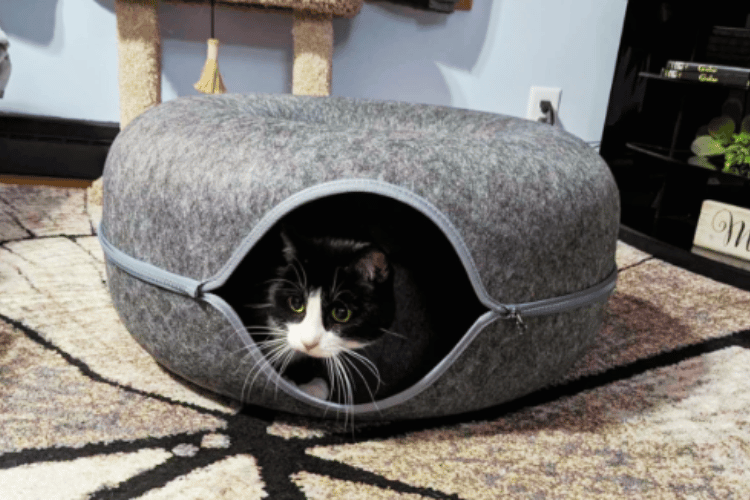Cats are mysterious and fascinating creatures, especially when it comes to their sleep habits. As a cat owner, you might wonder where should cats sleep at night to ensure they're comfortable and safe. This article will delve into the best practices for your cat's nighttime routines and provide insights into creating the perfect sleeping environment for your feline friend.
Key Takeaways:
- Understanding the natural sleep patterns of cats can help you create a better sleep environment.
- Providing a designated cat bed in a specific location can enhance your cat's sense of security.
- Ensuring the sleeping area is safe from potential dangers is crucial for your cat's well-being.
The Natural Sleep Patterns of Cats
Cats are crepuscular animals, which means they are most active during dawn and dusk. This natural rhythm dictates their sleep schedule, which can sometimes be at odds with human sleeping patterns. Most cats will adapt to the household routine, but it's important to understand that kittens sleep more than adult cats, and their need for sleep decreases with age.

Creating a Comfortable Cat Bed
When considering where should cats sleep at night, providing a cozy bed is essential. A cat bed should be soft and warm, offering the warmth and comfort that felines seek. Placing the cat bed in a quiet corner where your kitty can feel safe and undisturbed is a great idea. Some cats may prefer a cardboard box lined with a small blanket, as it provides a sense of security and privacy.
The Importance of a Specific Location
Cats are creatures of habit and thrive on routine. Choosing a specific location for your cat's bed helps them understand where they are expected to sleep. This could be in your bedroom, if you're comfortable with it, or in another quiet part of the house. The key is consistency, so your cat knows where to go when it's time to fall asleep.
Safety Concerns in the Sleeping Area
Safety is paramount when it comes to your cat's sleeping area. Ensure the space is free from potential dangers such as electrical cords, small objects they could swallow, or anything that could fall and hurt them. The right temperature is also important; the area should be neither too hot nor too cold for your cat's comfort.

The First Few Nights with a New Kitten
Introducing a new kitten to your home can be exciting, but the first few nights are crucial for setting a sleep schedule. A new kitten may feel anxious in a new environment, so it's important to provide a cozy bed and keep the litter box nearby. Keeping the door open can help the kitten feel less isolated and more at ease in their new home.
Bedtime Routine for Your Cat
Establishing a bedtime routine can help your cat understand when it's time to sleep. This could include playtime to expend energy, followed by a quiet period to help them wind down. Placing their food bowls away from their sleeping area can prevent them from waking up for a midnight snack and disrupting their sleep schedule.
The Role of the Litter Box
The litter tray should be accessible but not too close to where your cat sleeps. Cats prefer to keep their sleeping area clean and separate from where they do their business. Ensuring the litter box is in a convenient but discrete location can help maintain this natural preference.
Adjusting to Your Kitten's Sleep Schedule
When welcoming a new pet into your home, understanding kitten sleep patterns is crucial for a harmonious coexistence. Kittens are known for their erratic sleep schedules, often waking and seeking attention during the night. As an owner, it's important to be patient and help your kitten adapt to the household routine.
This may involve gently discouraging nocturnal play by not immediately responding to their wakeful antics. Instead, provide ample playtime during the day to tire them out before bedtime, which can help sync their sleep schedule with yours.

Creating a consistent night time routine is also beneficial for your kitten's adjustment. This includes designated feeding times, play sessions, and a calm period leading up to bed. By doing so, you signal to your kitten when it's time to wind down.
If your kitten continues to wake you during the night, resist the urge to feed or play with them, as this can reinforce the behavior. Instead, wait until morning to engage with them, which will help them understand the difference between day and night activities.
The Significance of Scent in Cat's Beds
Cats rely heavily on their sense of smell to navigate their world, and this extends to their own beds. A new bed may seem foreign and uninviting to a cat due to the lack of familiar scents.
To help your cat or kitten feel more at ease, you can introduce items with a familiar smell, such as a blanket or a piece of your clothing. This can make the new sleeping area more appealing and comforting, encouraging them to use their own beds rather than seeking out yours or other less suitable spots.
On the other hand, if your cat suddenly avoids their bed or any area where they usually sleep, it could be a sign of trouble. A change in behavior like this warrants attention, as it may indicate that something in their environment is causing them distress.
It could be as simple as the bed being too close to a noisy appliance or as serious as a health issue that a veterinarian should evaluate. Always be observant of such changes and ready to investigate the cause to ensure your cat's well-being.

Cats and Closed Doors
Some cats dislike closed doors as they can feel trapped or excluded. If your cat shows signs of distress when the bedroom door is closed, consider leaving it ajar or providing a cat bed in an area where they can have their own space without feeling isolated.
The First Night in a New Environment
A cat's first night in a new environment can be stressful. To help them feel safe, provide a familiar-smelling blanket or pillow in their bed. This can help them settle in more quickly and reduce anxiety.
The Right Temperature for Cat Sleep
Cats prefer a warm and cozy environment to sleep in. However, it's important to ensure the room isn't too hot, as this can cause discomfort. A small blanket or a cat bed with raised edges can provide the perfect amount of warmth for your kitty to cuddle into.

Potential Dangers to Watch Out For
Always check for potential dangers in your cat's sleeping area. This includes securing loose wires, ensuring there are no toxic plants within reach, and removing small objects that could be ingested. A safe environment is key to a good night's sleep for your cat.
Choosing the Right Cat Bed
When selecting a cat bed, consider your cat's preferences. Some cats like to stretch out, while others prefer a snug fit. There are various options available, from plush beds to elevated perches. Observe your cat's behavior to determine the best type of bed for them.
Should You Let Your Cat Sleep in Your Bed?
This is a personal choice for each cat owner. Some people enjoy the comfort of having their cat close by, while others prefer to keep their sleeping areas separate. Consider factors like allergies, sleep disturbances, and personal comfort when making this decision.
Toys and Playtime Before Bed
Engaging your cat in play before bedtime can help them use up excess energy and prepare for sleep. Providing toys that encourage natural hunting behaviors can be particularly effective. Just remember to put the toys away before settling down for the night to prevent any nocturnal play sessions.
The Benefits of a Closed Door
While some cats dislike closed doors, others may benefit from the separation. A closed door can signal to your cat that it's time to sleep and prevent them from waking you up during the night. It can also keep them safe from any potential dangers in the house while everyone is asleep.

Summary
Cats have unique sleeping needs that, when met, can contribute to their overall health and happiness. By understanding their natural sleep patterns, providing a comfortable and safe cat bed in a specific location, and establishing a consistent bedtime routine, you can help ensure your cat sleeps soundly through the night. Remember to keep their environment free from potential dangers and consider their individual preferences when it comes to their sleeping arrangements.
FAQ Section
How many hours a day do cats typically sleep?
Cats can sleep anywhere from 12 to 16 hours a day, with kittens and older cats tending to sleep more than adult cats.
Is it okay for my cat to sleep in bed with me?
It's a personal choice. If you don't have allergies and your cat doesn't disrupt your sleep, it can be okay. However, make sure your cat has its own bed as an alternative.
Should I play with my cat before bedtime?
Yes, playing with your cat before bedtime can help them expend energy and prepare for a restful night's sleep. Just ensure playtime ends a little while before you expect your cat to settle down for the night.
Thank you for visiting LegitLists we hope this helps you make a legitimate choice!






